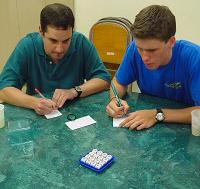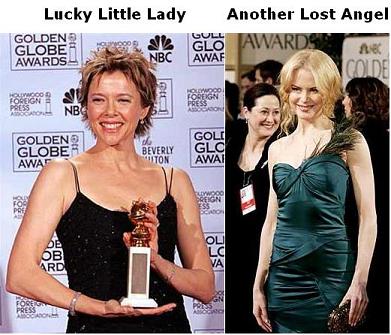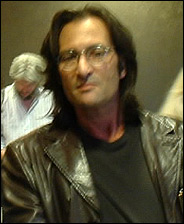Princeton Evangelical Fellowship (PEF):
Walter Kirn, Lost in the Meritocracy,
Atlantic Monthly Jan.-Feb. 2005

"Only by the form, the
pattern,
Can words or music reach
The
stillness."
-- T. S. Eliot
Walter Kirn, Lost in the Meritocracy,
Atlantic Monthly Jan.-Feb. 2005

"Only by the form, the
pattern,
Can words or music reach
The
stillness."
-- T. S. Eliot
I mean, seriously...
"The Comedians is about three men, Smith, Jones and
Brown...."
"Again I was aware of the three names, interchangeable like comic masks in a farce."
-- Graham Greene, The Comedians, Penguin paperback, 1991, p. 23
Pico Iyer on Graham Greene in the current New York Review of Books:
"To play out the full logic...."
|
Brown, Jones, and Smith are suspected of a crime. They testify as follows: Brown: Jones is guilty and Smith is innocent. Jones: If Brown is guilty then so is Smith. Smith: I’m innocent, but at least one of the others is guilty. Assuming all testimony is true, who is innocent and who is guilty? Assuming that the innocent told the truth and the guilty told lies, who is innocent and who is guilty? -- Mathematical logic |
But seriously...
A follow-up to the previous "tiger" entry (which was about an old but good dirty joke).
I just subscribed to The New York Review of Books online for another
year, prompted by my desire to read Roger Shattuck on Rimbaud, a tiger
of another sort:
"How did this poetic sensibility come to burn so bright?"
The Shattuck piece is from 1967, the year of The Doors' first album. (See Sunday's Death and the Spirit, Part II.)
the Spirit, Part III
From the dark jungle
as a tiger bright,
Form from the viewless Spirit
leaps to light.
-- Rumi,
"Reality and Appearance"
Globe Song
Are you a lucky little lady
in The City of Light
Or just another lost angel...
City of Night
-- Jim Morrison, L.A. Woman
(See Sunday's noon entry.)

Of course, it's the lost angels
that really get to us:

Death and the
Spirit, Part II
Are you a lucky little lady
in The City of Light
Or just another lost angel...
City of Night
-- Jim Morrison, L.A. Woman
Fourmillante cité,
cité pleine de rêves,
Où le spectre en plein jour
raccroche le passant
-- Baudelaire,
Les Fleurs du Mal,
and
Notes to The Waste Land
"When you got the mojo, brother --
when you're on the inside --
the world is fantastic."
-- Pablo Tabor in Robert Stone's
| Now it was Avril's turn to understand and he was frightened out of his wits.
"The Science of Luck," he said cautiously. "You watch, do you? That takes a lot of self-discipline." "Of course it does, but it's worth it. I watch everything, all Avril was silent for a long time. "It is the fashion," he said at "Don't blether." The voice, stripped of all its disguises, was "Not under that name." "I don't suppose you have. That's my name for it. What's its real name?" "The Pursuit of Death." |
Anagrams
In memory of Danny Sugerman,
late manager of The Doors:

Danny Sugerman
Photo by
Frank Alan Bella, 2002
"Mr Mojo Risin" = "Jim Morrison."
"Audible Era" = "Baudelaire."
"Bad Rumi" = "Rimbaud."
From the dark jungle
as a tiger bright,
Form from the viewless Spirit
leaps to light.
-- Rumi,
"Reality and Appearance,"
translated by R. A. Nicholson
(See also Death and the Spirit
from Twelfth Night, 2005, the date
of Danny Sugerman's death.)
Geometry Download
There is a new web page offering
my notes on finite geometry in a very large (about 7 MB) zipped folder
for downloading. (Individual notes may be previewed without downloading the folder.)
Hope of Heaven
"Heaven is a state,
a sort of metaphysical state."
-- John O'Hara, Hope of Heaven, 1938
"The old men know
when an old man dies."
-- Ogden Nash
See also the five Log24 entries
ending with the 9 PM entry of
Tuesday, December 10, 2002.
From today's New York Times:
"Joseph S. Frelinghuysen, whose memoir, Passages to Freedom, chronicled
his escape from a prison camp in Italy during World War II, died on
Saturday in Morristown, N.J. He was 92."
A web page on the Indiantown Gap army camp quotes Frelinghuysen's Passages to Freedom... He is describing July 1942, just before Frelinghuysen's unit was sent overseas:
"In the last week of July, his wife
Emily came to Indiantown to stay at the old Hershey
Hotel so they could steal a few of the remaining hours
together. He explained, 'On my last night with Emily,
she wore an evening dress with a full green and rose
colored skirt, and I put on my best garrison uniform
.... we had California champagne, lobster, and flaming
crepes with ice cream. We danced to some old tunes; Cole
Porter's 'Night and Day' and Irving Berlin's tunes from
'Top Hat.' Then they played a new one slowly, and a
young girl sang the lyrics to 'The White Cliffs of
Dover.' Noting that England had been at war for three
years, he reminisced that it was a song that speaks of
'love and laughter' and 'peace ever after.'
Nostalgically, he said, 'We finished the dance in an
embrace. She took my hand and we walked out through the
lobby onto the terrace for a last look at the gardens in
the pale light of a quarter moon.' "
the old man thought.
It is what every hero legend is about.
The darkness which is more than death,
the light which is love...."
Recent Comments